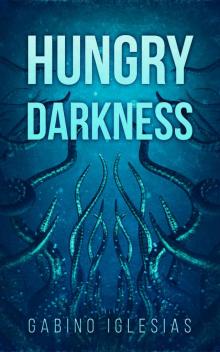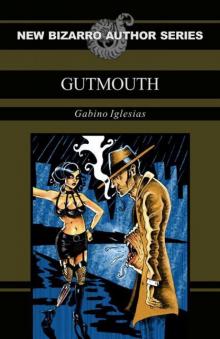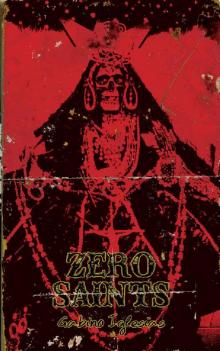- Home
- Gabino Iglesias
Both Sides Page 8
Both Sides Read online
Page 8
One day shortly after the revolutionary sects convened, a woman in a brown jumpsuit and purple handkerchief tied around her forehead threw pebbles from the dirt road against the door of my French countryside home until I answered. A second woman stood behind her, on guard.
“We’re The Maples,” the woman in the handkerchief said, still standing in the road. “We seek to eradicate all forms of complicity with the prior regimes attempting to destroy democracy. We have rules and the new law of the land is this: each property owner must eradicate any persons who step on their property unless you voice the word ‘enter.’ Also, if a person known to you to have been complicit tries to enter, you must eradicate that person. Are you in?”
The day was sunny, and I looked off to the lavender fields, rolling and purple and green. In the farthest distance was a field of sunflowers. My red barn hid in a divot of a valley, surrounded by tall cypress.
“Did you say eradicate?”
“I did, ma’am.”
“Your name?”
“Kenterwil.” Pointing behind her, but not looking, she said, “And this is my companion solider, Mona.” Mona nodded.
Kenterwil had a smudge of soot on her nose, and her brown hair hung in a ponytail beneath the compression of her purple handkerchief. Her accent was French, and given that she was speaking English to me, I surmised, correctly, she knew more about me than I her.
“In exchange,” she said. “We will protect you and your property. And, if I may, I know your land from grouse hunting with my father years ago. You have a cave surrounded by a stone wall. I’d suggest removing yourself to the cave for a bit. It’s too vulnerable here in your wooden house, even with our protections.”
“I’ve heard of The Maples, on the short wave,” I said. “I know of the sects’ agreements and rules. The mission statement.”
Kenterwil shrugged, as if to say, of course.
“Enter,” I said. “Both of you.”
Once on my doorstep, Kenterwil’s eyes were strangely captivating and intelligent. A uniform ice-gray. I’d only ever seen such irises on cats.
“I’m in. Actually, I’ve been waiting for this. I have some personal objectives, but I’d like to be an officer.”
Kenterwil looked to Mona, who threw her hands in the air in a gesture of so be it.
We shook hands, my initiation and admittance that fast, one sealed in soul and blood.
And now, now, two years after the Big Event, after Kenterwil, Mona, and I shook hands on my doorstep in France, here is Kenterwil gaining closer to my cave.
I set down my mug of wine and stare at Kristine, still perched on the rock wall.
“Please, please. I’m sorry. You were right. You were so right. I am sorry. Please let me enter,” she cries.
I strike a match and hold it to my cave’s entrance torches; the flames explode into two amber bubbles around the mouth. I allow Kristine to appreciate my wine-stained lips grinning at the women soldiers closing the snare around her. I begin to laugh, prompting the soldiers to laugh along, too. Kristine is not in on the joke.
These are my soldiers. My hill. My cave.
Two years ago when I landed in France, I made one phone call. Kristine picked up after two rings.
“You’re watching the news?” I asked.
“Of course. Where are you?” She asked.
“In France. I fled. Good luck on that side of the ocean.”
I meant it then as a taunt and a trap and a not-so-subtle seed of an option for her. I knew, I just knew, someday she’d follow the crumbs and come to my property. Seeking refuge.
So, I have been waiting all this time, and no, not once has my rage waned.
I flick all ten fingers into fans and dance them. This is my verdict to the soldiers, who await my sentence. This silent gesture says everything, and even nitwit Kristine can read this message. It means, “Dissolve her in the acid vats.”
She is screaming again as Mona cantilevers herself to the top of my stone wall and arm bars around Kristine’s neck. With her other arm, she grabs and holds around Kristine’s chest and dangles her off the wall, so that Kenterwil, my favorite, yanks her down and pulls all her rings off her fingers, plucks everything from her pockets, and rips her backpack off her back. Mona and Kenterwil will get the spoils of this take, I had promised them last night over baguette rations, after they delivered word they’d heard through the French grapevines of a woman named “Kristine” asking for directions to my property.
Mona and Kenterwil drag Kristine down the forested hill and toward the moon-glow barn that sits like an innocent haven between purple lavender fields. So charming, that ruse of a red barn, full of hungry poison, gluttonous acid, that will eradicate the complicity of Kristine. And though I think in only literal terms with respect to these current world politics, I will allow myself the metaphor that Kristine is indeed the American Figurehead, the one eaten by a tornado, the one who could be eaten ten times more, and ten times again.
Because she fed him, and he fed her, and you are what you eat, so he was her, and she was him.
COLIBRÍ
Nicolás Obregón
Milagros Posada put down the phone and went over the note she had just scribbled. Lone male discovered on cattle ranch. Decedent described as “young” + Mexican-looking”. Body found near a painted picture of a bird.
“Who wuzzit, Milly?” Across the room, Sheriff Jim Fraley was combing his eggshell-white slickback in the mirror. “I know you ain’t about to tell me we got another one.”
She nodded and Fraley swore. He was early sixties, perennially-sunburnt, a small man of good humor but ill temper—like somebody had dressed up a firecracker in a leather waistcoat. “Had to be today, huh.” He hand-licked a final silver strand behind his ear. “Where is it?”
“Out by El Hundido. Irvin Hoglund found the body.”
He fixed her in the mirror as though this was all her doing. “That’s near on an hour’s drive.”
Outside, a truck choked gravel and the sound of men convivial on lunchtime beer scudded through the window. Fraley’s scowl ossified into a grin as he put on his brand-new Stetson.
“What do I tell Hoglund, Sheriff?”
“Tell him it’s the goddam Fourth of Ju-ly. His stiff’ll keep till Monday.” At the door, Fraley paused and winked crinkles. “You’re in charge now, Milly. Don’t go doin’ nuthin’ I wouldn’t.”
Milagros heard wolf-whistling as he left. An engine rumbled, gravel popped, and the department was silent except for the old pedestal fan, slowly shaking its head, please no.
She shook her own head in agreement. Where once there had been thick, black curls, there was now grey, and there were pouches beneath her eyes, heavy with years of insomnolence. When her son was little, he said she looked like the lady from Sesame Street.
His memory made her close her eyes.
When she opened them, Milagros read her note again. She took a breath. Then she picked up the phone.
Irvin Hoglund walked with one hand on his gun. His land was way out in what his seasonal hands called “La Nada”. Out here, he never greeted anyone without suspicion, and always with his palm resting on the grip of the gun.
The summer heat was stupefying, like snorkeling through simmering cooking oil. An old black dog led the way. He was panting, quivering, eyes blue with blindness. Even so, the rancher followed him. Milagros too. The paths here were too broken, too treacherous for conventional tires. And so they followed the dog through a fraying patchwork of grazing lands dotted with creosote bush, catclaw and mesquite. Past bees defending Indian paintbrush and pineapple sage. And beneath vultures circling high above like some recess game.
In the distance, Milagros saw the country of her birth. Nickel-colored thunderheads warred silently over estranged mountains. The dog paused from time to time to catch his breath. His face was grey, his eyes watered when he considered the horizon.
“Does he know the way?” Milagros aske
d.
Hoglund grunted, yes.
“He looks blind.”
“Only his eyes.”
There was nothing else to say, so they said nothing.
For what felt a long time, Milagros and the rancher trudged through the lorn ranchland, the thick air branding their skin. The nameless trails that seamed through Hoglund’s land led out only to the desert, ten thousand square miles of nothing—a barren ocean of silence.
“How many of these paths feed out to the freeway, Mr. Hoglund?”
“Just one.”
He didn’t have to tell her where the others led.
Finally, the dog froze. His nose twitched. Whimpering, he ran down the dusty ridge. Milagros hurried after him as fast as she could in the heat. She heard the flies and the roaring sound of the freeway. It was a sound she had come to know. At the bottom the dog was barking. It was hotter down in the arroyo, a dusty furnace. The air was viscous with coyote piss. The flies were in flux, death’s own pinball.
The boy was lying in the shade beneath the tall governess bush, head propped up on his sneakers as though taking a nap. His dark hair was down past his ears, lips badly cracked, eyes covered by a baseball hat. His body was dark and lean, the knockoff soccer jersey he had been wearing, thrown off to the side. The jeans were too baggy, a belt looped around the upper branches of the bush.
“Must have thought about ending it,” Hoglund stood alongside her, shaking his head. “Looks about fourteen to me.”
Milagros folded her sheriff’s department ID into her shirt and crouched over the boy. Some of the denim at his ankle was shredded and brittle with blood, flies zipped in and out. Peeking through, she saw deep lacerations and smelled infection.
By the boy’s head, there was a dried puddle of vomit. His feet were severely blistered, Rice Krispies of pus riddled his soles, the skin of his toes like old newspaper. One foot had swollen way beyond the size of the other. Inside the sneakers there was the stench of filth, fine sand glittered in the fetid gloom. Milagros ran her fingers through the burning sand around the body. If this had been a murder, then this would be the murder weapon.
“Mr. Hoglund, when did you last pass through here?”
“Three days ago. Body weren’t here then.”
“Did you see anything out of place since?”
“No, but the night before last I heard a chopper fly low and hard over my land. You think maybe he got scattered?”
“It’s a possibility. His feet are in bad shape. If he was with a group they probably would have left him behind.”
Milagros had seen death this way many times before. By the time the boy laid down here, he would have been wracked by cramps, slurring his speech, hallucinating. The cells in his body would have shrunk as his dehydration worsened, his kidneys, lacking water and salt, would have shut down. After that, it wouldn’t have taken long until the desert claimed him, same as it claimed all things. Lying down there, under that bush, Milagros was certain the boy would have known: this is where I’m going to die.
There was a cell phone a few inches from his open hand but it was smashed and dead. An empty black gallon plastic jug lay nearby.
Picking it up, Milagros sniffed. “Spray-painted.”
“They all do that. How comes?”
“Harder to spot in the dark.”
“Well, he didn’t have near on enough.”
“No human could carry that much water.” Slipping on some latex gloves, she delicately searched his pockets but found no ID.
Patting the old dog, Hoglund pointed southward. “You go back a mile or two that way, the boy starts to shed stuff. Backpack, rest of his clothes. Heat musta started to really get to him. Still, he kept his pens.”
“Pens?”
The old rancher nodded to the small rocky outcropping across the arroyo. “Boy must a’ done that. Weren’t there before.”
Milagros turned to see the exquisite hummingbird drawn on the rock, a saturnalia of colored crayon, pastel, and Day-Glo blots from broken highlighters. In electric greens and deep purples, the hummingbird was in flight—iridescent wings drawn back, beak reaching for sky-nectar. The colors had bled down the rock, the hot wind already gnawing at them. Looking at its glimmering black eye, Milagros felt for a moment as though she were seeing some mythical creature and not the birds of her childhood that zipped beneath her window in the mornings.
Below the otherworldly hummingbird there was a small word scratched in black:
RUDI
“Was that your name?” Milagros whispered.
She allowed herself a single sigh. Then, locking away her feelings, she took out the department camera and photographed the hummingbird. She photographed every inch of the arroyo, the body, everything belonging to the boy.
When she was done, Milagros checked her watch. It had been less than forty minutes since they had set off from Hoglund’s place.
“Why didn’t he try and paint a whatyoucallit—SOS?”
“After what he’d been through, maybe he accepted the end.”
Milagros crouched down over the child once more and lifted the baseball hat to look into his eyes. They were beautiful and dead, like cherrywood. Even in death he looked towards his hummingbird.
The dog raised his head now. Crunching metal and the growl of thick tires could be heard—a vehicle approaching. The Ford Raptor came to a halt at the crest of the arroyo. A door slammed and heavy footfalls chawing over dusty stones. A man in green overalls stood above them. Gold letters on his body armor read: BORDER PATROL. Clambering down the slope, he stopped in front of Milagros, two heads taller.
“Christ, Milly—” He took off his tactical sunglasses and pinched the bridge of his nose. “How many times?”
She tipped the brim of an imaginary hat. “Tom.”
“Agent Maloney,” he corrected. “And you, Irvin. You always gotta call her out here on your little picnics, huh?”
The old man said nothing, just patted his dog.
Maloney turned back to Milagros. He was tall and muscular but with his straggly red whiskers he looked like a boy doing a man’s job. “Does Sheriff Fraley know you’re out here?”
“No, I’m just hiking.”
“Always funny, Milly. But I’m curious. You still gonna be laughing if I call Fraley and ask if you’re on official department business?”
“You call him while he’s out drinking with his buddies on the Fourth of July, he’ll tell you to take a long walk off a short dock. Now—” she nodded at the dead boy. “He can’t stay out here much longer. Where’s the M.E.?”
“Busy. They sent me.” Maloney approached the body and swatted the hat off. “Just a kid. Real shame.”
Milagros started climbing back up the arroyo.
“Then again, maybe he’d still be breathing if he’d gotten in line like everyone else, huh?”
“For him there was no line. You know that, Tom.”
Milagros drove her son’s old truck the twenty miles to Boca del Virgen, a tumbleweed town clutching onto the interstate like it would fall into the abyss otherwise. It was little more than a handful of breezeblock buildings and long-failed auto repair shops. Wares not stocked for decades were lies in peeling paint—sugar, tubing, cottonseed meal. An elderly couple watched TV outside on their porch, basking in the decline. The only functioning business was the diner. It didn’t have a name, the place had no use for one. Two flags drooped over the door, the American and the Salvadoran.
Milagros parked next to the other trucks, all of them new Ford Raptors gleaming government-white in the late afternoon blaze. Entering the diner, she was blasted with air con and gameshow fanfare.
Oh, my! Oh, my! Thank you. Thank you so much! Welcome to The Price is Right. Thank you, wow that is really special, folks. Real special. I gotta tell you, there are some wonderful prizes just waiting to be won today for smart shoppers. Only here on… THE PRICE IS RIGHT.
“Púchica, Mili.” Grinning, the old-timer behind the counter s
et down a polystyrene cup white as his hair, then sloshed in coffee, dark as his skin. “¿Qué onda, chera?”
“Félix,” she smiled. “¿Todo en orden?”
“Aquí me ves.”
“¿El negocio?”
“Pues está bien yuca—” as he ground cinnamon into the coffee he lowered his voice. “Fíjate, Mili. Hay pericos en la milpa.”
Milagros glanced over her shoulder at the only occupied booth and saw four men in green uniforms. She nodded. “Para esos estoy.”
“Vaya pues.”
She took out her purse but Félix waved away the silliness. Instead, he placed a repurposed coffee tin on the counter. “Biscochitos,” he winked. “Tienes que comer más, Mili.”
The men in the booth laughed hard now, and Félix took that as his cue to get back to work. Milagros approached the booth. The smallest of the men beamed at her, a rotund middle-aged man with a neat, greying moustache and spectacles. His patch read: SUPERVISORY AGENT JOSEPH SALGADO.
“Well look what the wind blew in. Deputy Sheriff Posada.”
They sniggered.
“Joe.”
“Thought you was Fee-lix for a second—” he propped himself up and shouted. “Hey, Fee-lix. Don-day es-tah la co-mida?”
The old man held up three fingers for minutes.
“Goddamn, at this rate it’s gonna arrive by reindeer.”
“We need to talk, Joe.”
“Sure. Take a pew.”
“Alone.”
Milagros sat a few booths away and nursed her cinnamon coffee. She waited and listened to a few more rounds of laughter which she knew would be at her expense.
Finally, Salgado dropped into the booth across from her, sipping his soda. He probed her with his eyes, trying to discern the taste of her, same as the Dr. Pepper rattling in his straw. There would have been a time when the scrutiny of such a man would have intimidated her. But that Milagros had dissolved a long time ago. Instead, she just stared right back.

 Both Sides
Both Sides Hungry Darkness: A Deep Sea Thriller
Hungry Darkness: A Deep Sea Thriller Gutmouth
Gutmouth Zero Saints
Zero Saints